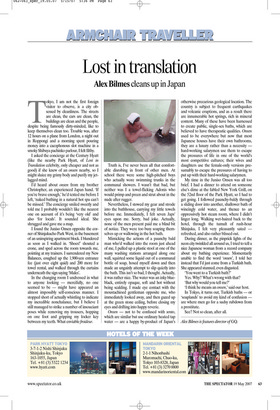Lost in translation
Alex Bilmes cleans up in Japan Tokyo, I am not the first foreign visitor to observe, is a city obsessed by cleanliness. The streets are clean, the cars are clean, the buildings are clean and the people, despite being famously dirty-minded, like to keep themselves clean too. Trouble was, after 12 hours on a plane from London, a night out in Roppongi and a morning spent pouring money into a cacophonous slot machine in a smoky Shibuya pachinko parlour, I felt filthy.
I asked the concierge at the Century Hyatt (like the nearby Park Hyatt, of Lost in Translation celebrity, only cheaper and not as good) if she knew of an onsen nearby, so I might sluice my grimy body and purify my jetlagged mind.
I’d heard about onsen from my brother Christopher, an experienced Japan hand. ‘If you’re brave enough,’ he’d texted me before I left, ‘naked bathing in a natural hot spa can’t be missed.’ The concierge smiled sweetly and told me I probably wouldn’t like the nearest one on account of it’s being ‘very old’ and also ‘for locals’. It sounded ideal. She shrugged and gave me a map.
I found the Juniso Onsen opposite the corner of Shinjukucho Park West, in the basement of an uninspiring apartment block. I blundered as soon as I walked in. ‘Shoes!’ shouted a crone, and sped across the room towards me, pointing at my trainers. I surrendered my New Balances, coughed up the 1,900-yen entrance fee (just over eight quid) and 200 more for towel rental, and walked through the curtains underneath the sign saying ‘Males’.
In the changing room I undressed in what to anyone looking — mercifully, no one seemed to be — might have appeared an almost impossibly self-conscious manner. I stopped short of actually whistling to indicate my incredible nonchalance, but I believe I still managed to strike a number of insouciant poses while removing my trousers, hopping on one foot and gripping my locker key between my teeth. What enviable froideur. Truth is, I’ve never been all that comfortable disrobing in front of other men. At school there were some high-pitched boys who actually wore swimming trunks in the communal showers. I wasn’t that bad, but neither was I a towel-flicking Adonis who would primp and preen and strut about in the nude after rugger.
Nevertheless, I stowed my gear and strode into the bathhouse, carrying my little towels before me. Immediately, I felt seven Japs’ eyes upon me. Sorry, bad joke. Actually, none of the men present paid me a blind bit of notice. They were too busy soaping themselves up or wallowing in the hot bath.
Mimicking the actions of a paunchy bald man who’d walked into the room just ahead of me, I pulled up a plastic stool at one of the many washing stations arranged along one wall, squirted some liquid out of a communal bottle of soap, hosed myself down and then made an ungainly attempt to slip quietly into the bath. This isn’t so bad, I thought. Actually, it was rather nice. The water was an inky blueblack, entirely opaque, soft and hot without being scalding. I made eye contact with the moustachioed gentleman opposite me, who immediately looked away, and then gazed up at the green stone ceiling, before closing my eyes and drifting into happy reverie.
Onsen — not to be confused with sento, which are similar but use ordinary heated tap water — are a happy by-product of Japan’s otherwise precarious geological location. The country is subject to frequent earthquakes and volcanic eruptions, and as a result there are innumerable hot springs, rich in mineral content. Many of these have been harnessed to create public, single-sex baths, which are believed to have therapeutic qualities. Onsen used to be everywhere but now that most Japanese houses have their own bathrooms, they are a luxury rather than a necessity hard-working salarymen use them to escape the pressures of life in one of the world’s most competitive cultures; their wives and daughters use the female-only versions presumably to escape the pressures of having to put up with their hard-working salarymen.
My time in the Juniso Onsen was all too brief. I had a dinner to attend on someone else’s dime at the fabled New York Grill, on the 52nd floor of the Park Hyatt, so I had to get going. I followed paunchy-baldy through a sliding door into another, shallower bath of wincingly cold water, and thence to an oppressively hot steam room, where I didn’t linger long. Walking wet-haired back to the hotel, through the tumult of rush-hour Shinjuku, I felt very pleasantly sated refreshed, and also rather blissed out.
During dinner, as the pinprick lights of the neon city twinkled all around us, I tried to tell a nice Japanese woman from a record company about my bathing experience. Momentarily unable to find the word ‘onsen’, I told her instead that I’d just come from a Turkish bath. She appeared stunned, even disgusted.
‘You went to a Turkish bath?’ Yes. Why? What’s wrong with that?
‘But why would you tell me?’ ‘I think he means an onsen,’ said our host.
In Tokyo, it turns out, Turkish baths — or ‘soaplands’ to avoid my kind of confusion are where men go for a sudsy rubdown from a prostitute.
See? Not so clean, after all.










































































 Previous page
Previous page